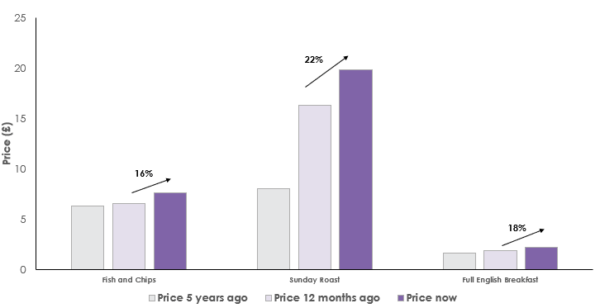
76% Rise in the Price of Britain’s Favourite Meals Since 2020

The cost of making a traditional Sunday roast has surged by 22% in the past 12 months and 76% over the last five years, say supply chain experts INVERTO, part of Boston Consulting Group. The biggest driver of this increase is the soaring cost of beef, which has risen 27% in just a year and by 177% since 2019. Over the last five years, the price of potatoes has also jumped 84%, while the price of cabbage has increased by 29%. Two more of Britain’s favourite meals have seen significant price hikes due to the inflated cost of key ingredients. The price of fish & chips is up 16% in the past year, and 20% over five years. The cost of a full English breakfast has jumped by 18% in the last year and 32% since 2019.
With UK inflation at around 3.7% over the same 12 month period, these increases show just how sharply the cost of these meals has surged.
Why are food prices rising?
A mix of global and domestic issues have driven up the cost of ingredients over the past five years:
- Global shipping disruptions – Wars in Ukraine and the Middle East have driven up fuel prices and disrupted key shipping routes, making it more expensive to transport food and other raw materials such as fertilisers, worldwide.
- Shortages of food products due to extreme weather – poor harvests have led to shortages of some imported foods, such as the unprecedented flooding in June 2024 across southern Germany, Europe’s largest producer of potatoes. Although Germany’s potato crop area grew by 9.3% in 2024 yields are estimated to have fallen by 6% due to heavy rainfall and delayed planting, further straining supply. Rising energy costs & trade barriers – Brexit-related trade restrictions and soaring energy prices have increased costs for food production, processing, and transport.
- Lingering Covid-era supply chain issues – Lockdowns and factory closures led to major delays in sourcing both ingredients and food processing machinery, particularly from China.
Katharina Erfort, Principal at Inverto, says, “Persistent inflation for food prices is one of the clearest signs that global supply chains are still suffering disruption. Over the past five years, staple dishes have become sharply more expensive to make for UK households.”
“Even when food is locally sourced it is likely to be dependent on inputs from overseas such as fertilisers and animal feeds which can be based on sunflower byproducts.”
“There is a significant role for food manufacturers and retailers in helping to bring food prices back down for consumers such as improved sourcing strategies. Several of the factors that drove inflation in ingredient prices – such as energy costs – are less of a factor now than they were two or three years ago. If their suppliers’ prices don’t yet reflect that, they may need to negotiate them back to appropriate levels.”
“Procurement teams should also look to diversify their supplier base across different regions where possible, so as to avoid the spikes in prices caused by extreme weather. Relying too heavily on one source increases risk when disruptions occur. Strengthening relationships with key suppliers can help manage these risks and prices more effectively.”
Britain’s favourite meals surge in price over last 5 years

With ongoing supply chain pressures, companies need to be proactive. That means identifying risks early, securing alternative suppliers, and improving forecasting to stay ahead of price volatility.














































